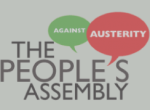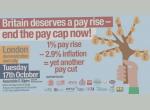"But other workers are losing their jobs."
Yes, and those workers could be our partners, sons, daughters or other dependants. If they lose their jobs, they will rely on our incomes more than ever.
Workers within TfL face job losses too. If we accept an inadequate pay deal, this will not protect our jobs: rather it will encourage management to attack them.
"But LUL/TfL has no money."
Really? It has put fares up and passenger numbers continue to rise, so the revenue is certainly coming in. The company seems to have enough money to run glossy campaigns and send staff on expensive workshops. It has also had to find the money to pay for the mess made by infracos, and to fund the many layers of bureaucracy created by the disastrous PPP. If it can afford these things, then it can afford to pay us what we deserve.
TfL/LUL is a public service. The government should reverse its privatisations, reunite it as a single company, and give it enough public funding to do its job properly - run a decent transport service with well-motivated and decently-paid staff.
"But we are already well-paid."
Compared with whom? Not with our over-paid top bosses, or with the politicians who are telling us to restrain our demands! Our employers, and others who always oppose our pay claims (such as the Evening Standard), always compare our pay rates with low-paid workers in other industries rather than with high-earners.
Given the cost of living in and around London, our current pay rates are not at all excessive. In fact, especially in the lower-paid grades, and especially if you have others who depend on you financially, as many of us have, it can be a real struggle to get by.
"The employers will see us as sensible and responsible if we moderate our demands."
No they won't: they will see us as weak. You will struggle to find any examples of employers rewarding workers for settling for little, but plenty of examples of them punishing timidness by launching further attacks.
"We will be really unpopular if we demand a lot."
If popularity won pay rises, then nurses would be millionaires and politicians would be begging on street corners!
But actually, if we stand up for ourselves, and explain our case to the public, we may inspire more support than you might anticipate.
"Prices are falling now, and there may even be deflation. Surely that means we should accept a lower pay rise, or even a pay cut."
No! Only some prices are falling. Prices of the luxury goods bought by the rich are falling faster than the essentials and everyday extras bought by workers, many of which are not falling but still rising. So a headline figure that there is deflation does not mean that demands on our incomes are falling.
In many cases, price cuts are only a slight readjustment following massive rises - so they are still rising overall. For example, food prices may have eased recently, but they are still up 6.2% year-on-year [British Retail Consortium (BRC) Neilsen Shop Price Index].
Recent price dips may well just be a blip, as there is widespread expectation that they will soon rise again. as a weak pound makes imported goods and materials more expensive.
Some 'falling prices' actually work against us. For example, falling house prices leave many workers in 'negative equity', owing more money on your mortgage than your house is actually worth. If your pay is held back too, the next step is repossession and homelessness.
- 3401 reads






